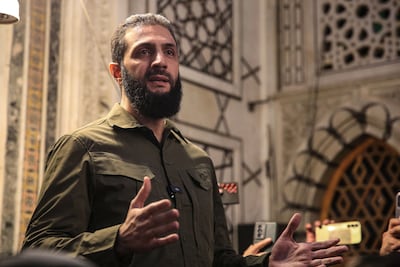The appointment of Ahmad Al Shara as President of Syria by his own supporters has sparked fears the country will fail to change into a system fundamentally different from the iron rule he played a main role in toppling.
A rebel coalition that overthrew former president Bashar Al Assad declared Mr Al Shara as Syria's leader on Wednesday. The coalition, called the Operations Room, is dominated by Mr Shara’s Hayat Tahrir Al Sham, a former offshoot of Al Qaeda and Al Nusra Front.
Walid Al Bunni, a prominent dissident and a former political prisoner, said the appointment ushered a transformation to a new “tyranny”.
“Syrians may accept this tyranny for a while, if Julani [Mr Al Shara’s previous nom de guerre] obtains financial support to bring in bread and some basic services,” said Mr Al Bunni,who was among the first non-violent figures in Syria to oppose Mr Al Assad when he came to power in 2000.
“But sooner or later, the revolution for a democratic Syria will be renewed,” he said, referring to the 2011 peaceful, pro-democracy uprising, which was crushed by the Assad regime, killing thousands.
New powers bestowed on Mr Al Shara by his own troops and auxiliaries gave him the authority to appoint a parliament for an unspecified transitional period and merge all the country's military, political and civil groups into the state.
The move represented a consolidation of power for the man who played the main role in toppling the former regime. In December, he led rebels from HTS’s base in Idlib on an offensive that overthrew Mr Al Assad in Damascus, a decade after Mr Al Shara had become the ruler of a northern fief.
Ahmad Aba Zeid, who became a young activist in the rural south of Syria when the uprising began in 2011, said the apparent power given to Mr Al Shara to dissolve every group in the country could be ”an arbitrary start to restricting public space”.

“The military groups have a right to disband,” he said. “But who has the right to dissolve the political and civil groups that had sprung from the revolution?"
Mohammad Salloum, a Syrian political satirist who rose to prominence after leading civil disobedience in Idlib at the start of the 2011 uprising, said the appointment mirrored the history of military coups in Syria. These coups were marked by military officers declaring themselves president before overseeing rubber-stamped elections to further legitimised their rule.
“Ahmad Al Shara is still Al Julani,” said Mr Salloum. He has not changed from a leader of the uprising into a statesman, he added.
But prominent political commentator Ayman Abdel Nour said Mr Al Shara had to make the move because of the political and legal vacuum in the country.
“He has to legitimise the new state,” said Mr Abdel Nour, a Syrian engineer who worked on reforming the system with Mr Al Assad, before becoming disillusioned with his rule in the 2000s. ”How else would new laws be enacted? To whom ministers would swear loyalty?”
“Shara’s first test will be who he appoints to the legislature,” said Mr Abdel Nour, pointing out that the first parliament after Hafez Al Assad came to power in 1970 comprised regime loyalists only.


